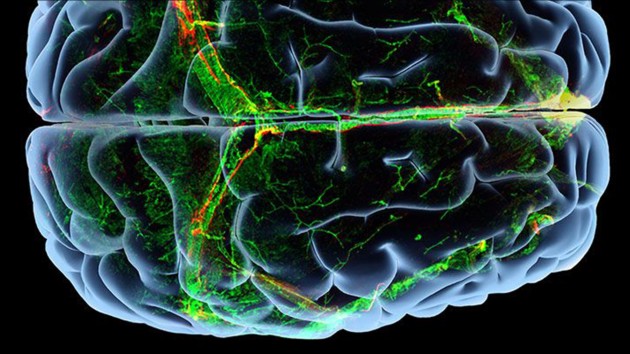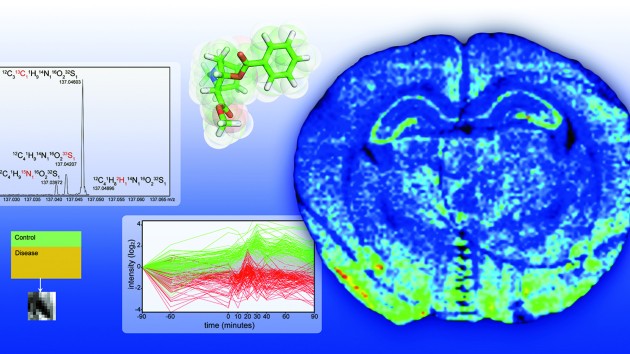Collections
Filters
-
Collection Type
-
-
Series |
 2022 Neuropsychopharmacology Reviews: Prefrontal Cortex
2022 Neuropsychopharmacology Reviews: Prefrontal Cortex
The prefrontal cortex (PFC) is essential for developing action plans, driven by the coordination of cognitive and emotional processes, that relies on both current goals and future plans.
Image: Haber Lab -
Series |
 2021 Neuropsychopharmacology Reviews: Big Data in Psychiatry
2021 Neuropsychopharmacology Reviews: Big Data in Psychiatry
It is now clear that unraveling how the brain creates behavior, and how this understanding can better inform new therapies and interventions, will require vast new approaches to tackling the complex problems in Neuroscience and Psychiatry. Fortunately, tremendous evolution in sample sizes, computing power, neuroimaging technologies, digital approaches to phenotyping, and computational modeling have rapidly brought in a new era of Big Data in Psychiatry. How we understand and utilize computational approaches to enormous data, from genomics to neuroimaging to phenotyping, may well determine our success as a field in the coming years. To address these issues, the 2021 Neuropsychopharmacology Reviews edition aims to cover a broad swath, from digital data collection, to neuroimaging across development, to multiomics across disorders, to computational approaches to Big Data in Psychiatry.
-
Series |
2020 Neuropsychopharmacology Reviews: Sleep and neuropsychiatric illness
As we delve deeper into the relationships between neuropsychiatric illnesses and sleep, the conclusion that the two are entwined continues to be underscored. The 2020 Neuropsychopharmacology Reviews, “Sleep and neuropsychiatric illness,” edited by Dr. John W. Winkelman and Dr. Luis de Lecea, highlights what we know, what we do not, and what we’d like to know of the effect disturbances in sleep/circadian rhythms have on neuropsychiatric illness and the underlying neurobiological mechanisms. What is the role of sleep in maintaining a healthy brain?
-
Series |
 2019 Neuropsychopharmacology Reviews: Sex Matters
2019 Neuropsychopharmacology Reviews: Sex Matters
The 2019 Neuropsychopharmacology Reviews, "Sex Matters," edited by Dr. Tracy L. Bale, highlights the causal and mechanistic value in cases where significant sex differences are found, as well as when they’re not; where sex differences may arise at one period of life and disappear in another. Additionally, this special issue reinforces the message that males are not the control, and females are not more variable.
-
Series |
 2018 Neuropsychopharmacology Reviews: Cannabis and Cannabinoids: From Synapse to Society
2018 Neuropsychopharmacology Reviews: Cannabis and Cannabinoids: From Synapse to Society
The 2018 issue of Neuropsychopharmacology Reviews, "Cannabis and Cannabinoids: From Synapse to Society," showcases the remarkable advances in the biology of cannabinoids and cannabis in the past two decades, ranging from their impact at the synaptic level through to public health. Edited by Margaret Haney and Matthew N Hill, this issue represents current findings across several major research areas, contributing novel insights into psychiatric illness treatment and a data-driven perspective relevant to public policy changes occurring worldwide. Papers include Nature-quality illustrations that can be downloaded into PowerPoint slides for teaching or presenting.
Image: Erin Dewalt -
Series |
 2017 Neuropsychopharmacology Reviews: The Immunology of Behavior—Exploring the Role of the Immune System in Brain Health and Illness
2017 Neuropsychopharmacology Reviews: The Immunology of Behavior—Exploring the Role of the Immune System in Brain Health and Illness
Neuropsychopharmacology Reviews: The Immunology of Behavior—Exploring the Role of the Immune System in Brain Health and Illness.
-
Series |
 2016 Neuropsychopharmacology Reviews: Impact of Stress on the Brain: Pathology, Treatment and Prevention
2016 Neuropsychopharmacology Reviews: Impact of Stress on the Brain: Pathology, Treatment and Prevention
Neuropsychopharmacology Reviews: Impact of Stress on the Brain: Pathology, Treatment and Prevention
Image: PASIEKA; Erin Dewalt -
Series |
 2015 Neuropsychopharmacology Reviews: Neurodevelopment and the Origins of Brain Disorders
2015 Neuropsychopharmacology Reviews: Neurodevelopment and the Origins of Brain Disorders
Neuropsychopharmacology Reviews: Neurodevelopment and the Origins of Brain Disorders .
-
Series |
 2014 Neuropsychopharmacology Reviews: Biomolecular Discovery: Mechanisms, Therapeutics, and Biomarkers in Neural Disorders
2014 Neuropsychopharmacology Reviews: Biomolecular Discovery: Mechanisms, Therapeutics, and Biomarkers in Neural Disorders
Neuropsychopharmacology Reviews: Biomolecular Discovery: Mechanisms, Therapeutics, and Biomarkers in Neural Disorders.
-
Series |
 2013 Neuropsychopharmacology Reviews: Epigenetics
2013 Neuropsychopharmacology Reviews: Epigenetics
Neuropsychopharmacology Reviews: Epigenetics.
Image: Erin Dewalt -
Series |
 2012 Neuropsychopharmacology Reviews: Neurotherapeutics
2012 Neuropsychopharmacology Reviews: Neurotherapeutics
Neuropsychopharmacology Reviews: Neurotherapeutics.

 2024 Neuropsychopharmacology Reviews: Rapid and Novel Treatments in Psychiatry
2024 Neuropsychopharmacology Reviews: Rapid and Novel Treatments in Psychiatry